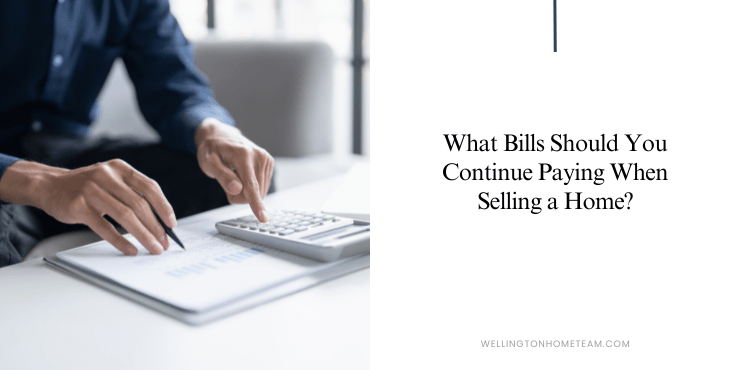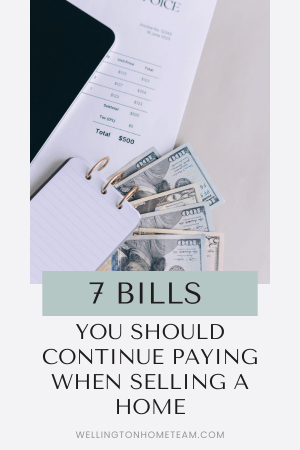What Bills Should You Continue Paying When Selling a Home?
When selling a home, there’s a lot to juggle—from getting the property ready for sale to organizing the move itself. One question that often comes up during this process is whether or not you need to continue paying certain bills. As a homeowner, you’re accustomed to paying monthly expenses, but during a sale, it can be unclear which bills you still need to cover. In this article, I’ll explain which bills you should continue paying while selling your home, so you can stay on top of your finances and have a smooth transaction.

7 Bills You Should Continue Paying When Selling a Home
1. Mortgage Payments
The first and most important bill that homeowners must continue paying during the selling process is their mortgage. Even if you’re no longer living in the home, the mortgage payments are due until the home is sold and the loan is fully paid off. Neglecting mortgage payments can have serious consequences, such as damaging your credit score, paying late fees, and risking foreclosure. It’s important to stay on top of your mortgage payment schedule until the closing process is complete.
Now, most homeowners are aware that their lender likely offers a grace period, allowing them to make their mortgage payment late without penalty as long as it’s within a certain number of days. Because of this, some home sellers scheduled to close on the 3rd of the month choose to skip the payment on the 1st, knowing they won’t incur any penalties. While this can work out, if the closing is delayed, missing a payment could create issues. To avoid potential complications, it’s important to understand your lender’s policies and be prepared to make the payment if necessary.
2. Property Taxes
Another important bill to keep paying when selling your home is property taxes. Most homeowners pay property taxes quarterly, annually, or as part of their monthly mortgage payment. If your taxes are included in your mortgage, there’s no need to worry about making separate payments—the closing company will ensure your portion is covered. However, if you pay property taxes directly, you’ll need to stay current to avoid potential liens that could delay the sale.
While you won’t be responsible for the full year’s property taxes if the home sells before year-end, you are still required to cover your share up until the sale is complete. In most cases, property taxes are prorated at closing, with the buyer assuming responsibility moving forward.
3. Utilities
The last thing you want when selling a home is for the electricity or water to be shut off, so it’s important to keep paying all utility bills. In some areas, this also includes trash pickup, gas, and sewer services. Even if you no longer live in the home and want to cut costs don’t!
Nobody wants to tour a home that’s 90 degrees just because you’re trying to “save” money by turning off the electricity. Additionally, the home inspector will need the utilities on to conduct a thorough home inspection. Once the sale has closed and the transaction has been funded, you can cancel all utilities. In fact, I highly recommend making sure the buyer has transferred the utilities into their name. If not, you should cancel the service to avoid being stuck paying their bills until the issue is discovered.
Selling a home involves many decisions, including which bills you need to keep paying during the home selling process and here are the top 7 bills. #realestate #homeselling4. Homeowner’s Insurance
It’s important to maintain your homeowner’s insurance policy while selling your property. This ensures you’ll have coverage in case anything unexpected happens during the sale process, such as damage to the property from a storm, fire, or vandalism.
You might be tempted to cancel your homeowner’s insurance as soon as you move out, but doing so could leave you financially exposed. Until the sale is complete and the buyer has officially taken ownership, you’re still legally responsible for the home. Even if you’re not physically occupying the property, maintaining coverage provides peace of mind that your property is protected from any potential damage.
If you’re unsure whether you need to keep your homeowner’s insurance policy active, consult with your insurance provider to discuss your options. They may be able to offer a temporary policy that’s tailored to your needs during the selling process.
5. Homeowners Association (HOA) Fees
If your home is part of a homeowners association (HOA), continue paying your HOA fees until the sale is complete. Failing to pay HOA dues could result in fines or a lien, which could delay or complicate the sale of your property. Just like property taxes, the HOA fee will be pro-rated, so you don’t need to worry about overpayment. For example, if you paid the HOA dues on the 1st of the month and close on the 10th, the buyer will credit you at closing for their portion of the dues under their ownership.
 Remember most HOAs have strict rules and regulations, so it’s important not only to stay current with your HOA dues but make sure you don’t have any outstanding balances. If you have a past-due HOA balance you’ll want to get caught up right away. If you don’t have the funds to catch up, try working with your HOA. Let them know you’re in the process of selling and ask if you can pay the balance at closing. Also, inquire about the possibility of them placing a lien on the property, which you want to avoid at all costs.
Remember most HOAs have strict rules and regulations, so it’s important not only to stay current with your HOA dues but make sure you don’t have any outstanding balances. If you have a past-due HOA balance you’ll want to get caught up right away. If you don’t have the funds to catch up, try working with your HOA. Let them know you’re in the process of selling and ask if you can pay the balance at closing. Also, inquire about the possibility of them placing a lien on the property, which you want to avoid at all costs.
The closing company will verify that you’re up to date with your HOA dues and that there are no outstanding violations. So it’s always best to stay ahead to avoid any last-minute scrambles.
6. Maintenance Costs
If you pay for additional services tied to the home, such as pest control, pool service, or landscaping, you’ll want to continue paying those bills. However, you can inform your service providers once you know the closing date, and ask them to stop services after that date.
While it may be tempting to cancel these services during the home-selling process, it’s best not to. For starters, you don’t know how long it will take to sell your home, it could be a month or four. Additionally, you can’t turn the home over to the buyer on the day of closing with grass that’s a foot high and a green pool.
7. Repair Costs
f you hired a contractor before or during the selling process, make sure you pay them as agreed. Contractors have the right to place a lien on your home if you owe them money and stop paying. Some contractors may allow you to pay them out of the closing proceeds, if that’s the case make sure this agreement is in writing. If you have no intention of paying the contractor because they didn’t complete the job or did it poorly, it’s a good idea to seek legal advice. The last thing you want is a contractor coming out of the woodwork and trying to collect payment.
Bills You Can Stop Paying When Selling a Home
There are several other bills tied to the home that you can stop paying and have shut off, including:
- Internet
- Cable
- Landline Phone
- Dish TV Services
- Home Security System
- Delivery Services (such as water)
Popular Billing Questions When Selling a Home
Is a new homeowner responsible for previous utility bills? No, a new homeowner is typically not responsible for the previous owner’s utility bills. The responsibility for utility bills usually ends when the property changes hands, and the new owner starts their own account with the utility providers.
How do utilities work when selling a house? Sellers should keep all of the utilities on until after the transaction has closed and funded, then they can have them turned off and the buyers can establish service in their name.
Can I expect a refund for prepaid property insurance premiums? Yes, when you sell your home, your insurance provider will usually refund the unused portion of the premiums, which will be prorated based on the cancellation date. Be sure to contact your insurance company to notify them of the sale and request the refund.
When do I need to cancel my homeowner’s insurance? Once the transaction has closed and funded you can notify your home insurance carrier. Be sure to provide them with the closing statement, as most carriers will require it to confirm the effective date for stopping coverage.
What happens to prepaid utilities (like water or gas)? If the seller has prepaid for these services, they may be entitled to a refund for the unused portion, or the buyer might be responsible for reimbursing the seller for the portion used after the closing date. The exact handling of prepaid utilities is usually outlined in the sales contract and adjusted during the closing process.
Final Thoughts
Selling a home involves many moving parts, and managing your bills is one of them. While there are certain bills you can stop paying, there are many tied to the house that you must continue paying until closing. By staying on top of these payments, you will reduce stress and avoid potential issues, as unpaid bills can complicate the home-selling process.
Please consider spreading the word and sharing; What Bills Should You Continue Paying When Selling a Home?
Selling a home involves many decisions, including which bills you need to keep paying during the home selling process and here are the top 7 bills. #realestate #homesellingAbout the Author
Top Wellington Realtor, Michelle Gibson, wrote: “What Bills Should You Continue Paying When Selling a Home?”
Michelle has been specializing in residential real estate since 2001 throughout Wellington Florida and the surrounding area. Whether you’re looking to buy, sell, or rent she will guide you through the entire real estate transaction. If you’re ready to put Michelle’s knowledge and expertise to work for you call or e-mail her today.
Areas of service include Wellington, Lake Worth, Royal Palm Beach, Boynton Beach, West Palm Beach, Loxahatchee, Greenacres, and more.

 Michelle Gibson of the Hansen Real Estate Group Inc is a full-time REALTOR who has been specializing in Wellington, Florida real estate since 2001. This veteran of the real estate industry has expertise in technology, marketing, and social media.
Michelle Gibson of the Hansen Real Estate Group Inc is a full-time REALTOR who has been specializing in Wellington, Florida real estate since 2001. This veteran of the real estate industry has expertise in technology, marketing, and social media.